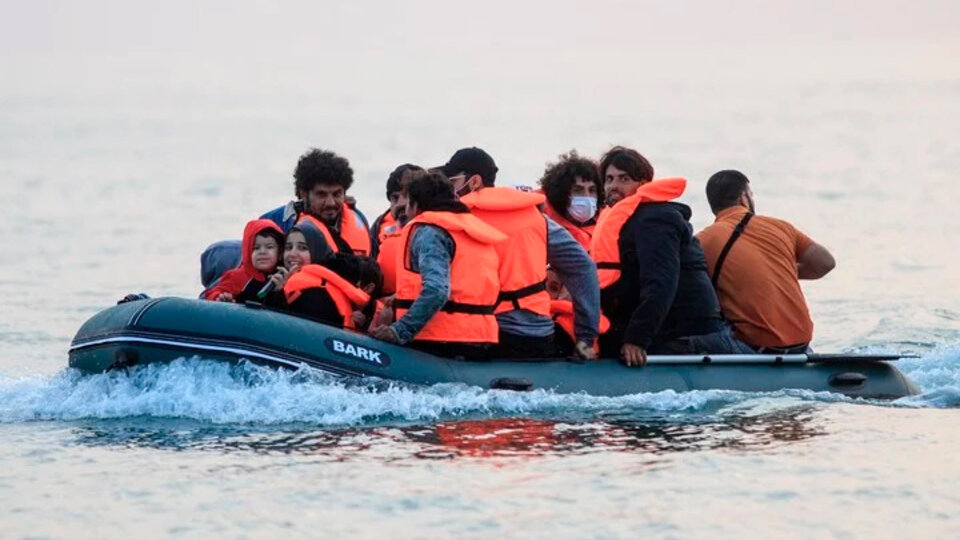
[ad_1]
“They died little by little. First the children and then the women.” One of seven survivors of an inflatable boat that left the Sahara with 54 people and drifted for 13 days before ending up on a beach in Mauritania recounts the latest tragedy on the migratory route to the Canary Islands, Spain, the most dangerous in Africa.
From a migrant detention center in Mauritania, Moussa (the fictitious name he gives so as not to reveal his identity) recalled his “hell” of almost two weeks aboard a semi-rigid boat, those who are swallowed up by the waves as soon as the sea is rough.
Her case was an exception, Helena Maleno, spokesperson for the NGO Caminando Fronteras, Moussa’s interlocutor, tells Efe that she saw dozens of rubber boats disappear shortly after her departure.
Helena is also witnessing the proliferation of this type of boat on the Canary Islands route, which further aggravates its dangerousness. “1000 kilometers. This is the first time that we have seen a zodiac hold so much”, dice.
But the endurance of Moussa’s boat was not matched by that of its crew, who they were dying of thirst and hunger as the days went by, despite the help of some Moroccan fishermen with whom they made the crossing. We gave them, remembers this Guinean, two or three bottles of water for 54 people. It was not enough.
Two brothers survive together
From a police station in Nouadhibou, Mauritania, an exhausted Moussa uses a cell phone borrowed from a local neighbor to speak with Hélène, who comes every day to feed them. Here he is with three other traveling companions: two Malian brothers and a Senegalese. The other three survivors are recovering in hospital.
His nightmare began on August 3, when these 54 people, mostly from Guinea Conakry, Senegal, Côte d’Ivoire and Mali, boarded a fragile boat near El Alaiún (Western Sahara). ), built to house much less and with the intention to travel approximately 125 kilometers to the island of Fuerteventura (Canary Islands).
A day and a half after leaving, they ran out of gas. They weren’t far from shore and they were passing fishermen, but none, Helena believes, called authorities to warn of the drifting boat.
The boat then continued on its course southwards swept away by the sea and the lack of water and food began to wreak havoc. His teammates were dying “little by little”, explains Moussa. First the children (there were three of them) then the women. Of the ten who traveled in the boat, only one survived, currently in a hospital in Nouadhibou.
“People fell asleep and died, others threw themselves into the sea”, Moussa recalls, and remembers how finally, 13 days later, the whim of the currents took the boat to a Mauritanian beach. On reaching the coast, three more people died.
To the west, 4,500 kilometers of water
Moussa’s boat could have had an even worse result. The sea could have carried them inland, where 4,500 kilometers of the Atlantic Ocean awaited them in the west.. In fact, this year there are already two boats arriving half destroyed in Trinidad and Tobago with corpses on board. Most of them are swallowed up by the sea.
Now, Moussa is afraid of being deported and left in the middle of the desert on the border with Mali, as the Mauritanian authorities usually do when they have evidence of migrants of this nationality.
“Promise me that they will not take me to the desert,” he implores over the phone he lent to Hélène, who calls for more benevolent treatment for these shipwrecked people from Mauritania. “We ask the Mauritanian authorities not to subject them to an expulsion procedure, in particular these victims of tragedies. They are devastated.”
From Moussa’s story, Helena draws another thought. He believes that none of these fishermen who helped the emigrants informed the Moroccan authorities. They are, he said, afraid of. “I ask you to report. Tragedies can be avoided. You don’t have to be afraid, the important thing is to save lives.”
Helena keeps receiving calls from relatives of the women who were on the raft. They expected to hear from them on August 4 after a scheduled 24-hour crossing to the Canary Islands, but the news never arrived.
The worst is yet to come
If 2020 was a historic year in terms of resumption of emigrant arrivals to the Canaries, 2021 doubles its figures. As of August 1, there were already 7,531 people, compared to 3,185 the previous year.
And the worst is yet to come. From the end of September, when the Atlantic calms a bit and the Alísean winds accompany it, the boats multiply.
Helena is particularly concerned about two things: the emigration of Moroccans, which has increased exponentially last year, and boats like Moussa’s.
“We have seen an increase in inflatable rafts in the Atlantic, which were not previously available,” he warns. Moussa could see it on his skin and with what he went through, he doesn’t want to try again. “I just want to go back to Guinea. I want to see my wife and my children.”
.
[ad_2]
Source link
 Naaju Breaking News, Live Updates, Latest Headlines, Viral News, Top Stories, Trending Topics, Videos
Naaju Breaking News, Live Updates, Latest Headlines, Viral News, Top Stories, Trending Topics, Videos